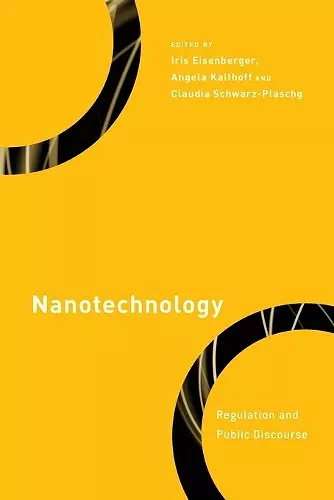Nanotechnology
Regulation and Public Discourse
Angela Kallhoff editor Iris Eisenberger editor Claudia Schwarz-Plaschg editor
Format:Paperback
Publisher:Bloomsbury Publishing PLC
Published:4th Mar '22
Currently unavailable, and unfortunately no date known when it will be back
This paperback is available in another edition too:
- Hardback£120.00(9781786608932)

This volume offers insights into the ethical, legal, and societal aspects of nanotechnology, exploring how norms and practices have evolved in this rapidly changing field.
In recent decades, the field of nanotechnology has garnered significant attention due to its potential to revolutionize various industries, including medicine, cosmetics, and environmental remediation. However, with the rapid advancements in this area, concerns have emerged regarding the safety and ethical implications of engineered nanomaterials. This volume delves into the complex interplay between innovation and regulation, examining how societal practices and legal frameworks have evolved to address these challenges.
The chapters within Nanotechnology draw from a wide range of disciplines, including ethics, ecology, law, and social and political sciences. By exploring normative approaches and evaluative methods, the book provides a comprehensive overview of the mechanisms that have been developed to govern the use of nanomaterials. It highlights the importance of establishing guidelines that not only promote innovation but also ensure the protection of human health and the environment.
Through a collaborative effort, the contributors to Nanotechnology present diverse perspectives on how societal actors can actively engage in shaping the discourse surrounding nanomaterials. They emphasize the need for ongoing dialogue and collaboration among researchers, policymakers, and the public to foster responsible development in this promising yet contentious field.
This volume includes 12 conference-based papers. The editors note that though nanotechnologies benefit from both judicial rulings and industrial self-regulation, limited academic involvement has exposed gaps. The contributors follow the ethical, legal, and social aspects (ELSA) approach, with the goal of offering guidelines for reflection. The essays appear under three headings: "Evaluation and Standardisation," "Norms and Regulation," and "Politics and Publics." As with any emerging technology, the matter of anticipatory governance rests at the center of such debates, and the contributors often refer back to the example of biotechnologies, identifying interesting parallels regarding the potential pitfalls of nano-marketing. For example, incomplete information and resulting controversies in the case of genetically manufactured foods suggest cautionary approaches and stress the need for better public information and consultation. Though grounded in the European framework (especially Austria and Western Europe), the volume serves as a basis for further exploration of the issues it raises in other national and cultural contexts. The solid introduction and 20-plus boxes and graphs make up for complex summaries and acronym-heavy explanations.
Summing Up: Recommended. Graduate students, researchers, faculty, professionals.
Nanotechnology: Regulation and Public Discourse offers important insights into how, paradoxically, the smallest things seem capable of posing the biggest challenges to the world. Taking a comprehensive and multidisciplinary perspective, it integrates governance within and beyond the law, thus, deriving regulatory solutions from the micro-level for the macro-level. A highly instructive book for everyone interested in innovation and shaping a forward-looking normative frame for emerging technologies. -- Rostam J. Neuwirth, Professor, Faculty of Law, University of Macau
The book Nanotechnology: Regulation and Public Discourse skillfully investigates society’s normative practices for adopting new technologies. By probing the subject of nanotechnology, this important book breaks new ground within our understanding of contemporary mechanisms for assessment and definition of new technological advances. Taking matters further, this volume proposes methodological and normative guidelines that aid our preparation for better nanotechnological futures. -- Joakim Juhl, Assistant Professor, Department of Planning, University of Aal
ISBN: 9781538147900
Dimensions: 220mm x 154mm x 16mm
Weight: 417g
308 pages